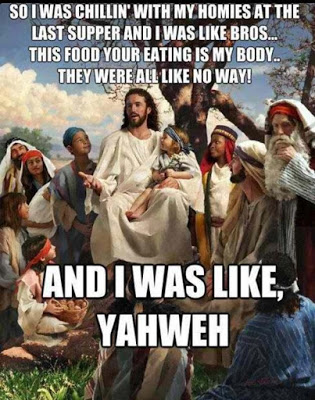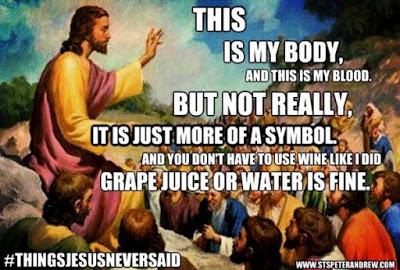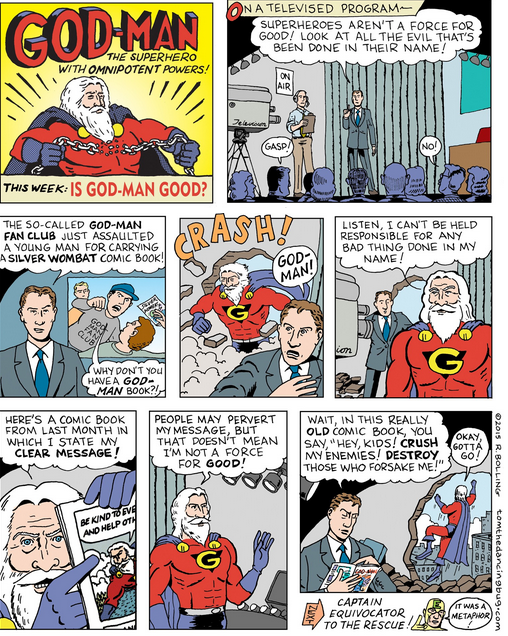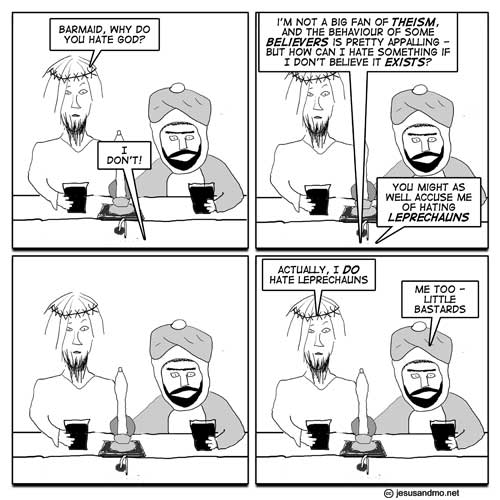“Love One Another, As I Have Loved You”
Luke 22:1–38; John 13–15
LDS manual: here
Purpose
To show readers that Jesus is neither the way, the truth, nor the life.
Reading
Things are starting to come apart for Jesus and the Disciples. One member of the group is thinking of going solo, due to creative differences. The rest of the disciples are hiding out with Jesus during Passover, which — as you’ll remember — is a celebration of the time Jehovah killed a bunch of children because he disagreed with Egypt’s immigration policy.
While there, Jesus starts a tradition called the sacrament, which was originally Jesus’ flesh and blood, but thanks to latter-day revelation is now white bread and room-temperature tap water.
The centrepiece of this reading is a rambling, incoherent discourse in which Jesus lies to his followers about the power of prayer, says some nice things about love, and opens up about his relationship with his dad. So let’s get to that.
Main ideas for this lesson
Sacrament
Here’s where Jesus encourages ritual cannibalism.
Luke 22:17 And he took the cup, and gave thanks, and said, Take this, and divide it among yourselves:
22:18 For I say unto you, I will not drink of the fruit of the vine, until the kingdom of God shall come.
22:19 And he took bread, and gave thanks, and brake it, and gave unto them, saying, This is my body which is given for you: this do in remembrance of me.
22:20 Likewise also the cup after supper, saying, This cup is the new testament in my blood, which is shed for you.
You might remember that Jesus explained this earlier, in more blood-curdling terms.
John 6:53 Then Jesus said unto them, Verily, verily, I say unto you, Except ye eat the flesh of the Son of man, and drink his blood, ye have no life in you.
6:54 Whoso eateth my flesh, and drinketh my blood, hath eternal life; and I will raise him up at the last day.
6:55 For my flesh is meat indeed, and my blood is drink indeed.
6:56 He that eateth my flesh, and drinketh my blood, dwelleth in me, and I in him.
Mormons quite sensibly refrain from interpreting this literally.
Unlike our Catholic friends, who think it’s very literal. Some Catholics threatened noted atheist PZ Myers with violence when he floated the idea of desecrating a cracker.
That’s right. Crazy Christian fanatics right here in our own country have been threatening to kill a young man over a cracker.
…
I find this all utterly unbelievable. It’s like Dark Age superstition and malice, all thriving with the endorsement of secular institutions here in 21st century America. It is a culture of deluded lunatics calling the shots and making human beings dance to their mythical bunkum.
So, what to do. I have an idea. Can anyone out there score me some consecrated communion wafers? There’s no way I can personally get them — my local churches have stakes prepared for me, I’m sure — but if any of you would be willing to do what it takes to get me some, or even one, and mail it to me, I’ll show you sacrilege, gladly, and with much fanfare. I won’t be tempted to hold it hostage (no, not even if I have a choice between returning the Eucharist and watching Bill Donohue kick the pope in the balls, which would apparently be a more humane act than desecrating a goddamned cracker), but will instead treat it with profound disrespect and heinous cracker abuse, all photographed and presented here on the web. I shall do so joyfully and with laughter in my heart.
The episode became known as Crackergate, and the resulting brouhaha surrounding the disrespect of a cracker is indicative of the fervour that believers are able to generate, and the madness of supernatural belief.
Washing of feet and the Second Anointing
Washing someone’s feet seems like a strange thing to do, though it could be symbolic of an act of service. Jesus strips down, and makes with the towel.
John 13:4 He riseth from supper, and laid aside his garments; and took a towel, and girded himself.
13:5 After that he poureth water into a bason, and began to wash the disciples’ feet, and to wipe them with the towel wherewith he was girded.
13:6 Then cometh he to Simon Peter: and Peter saith unto him, Lord, dost thou wash my feet?
13:7 Jesus answered and said unto him, What I do thou knowest not now; but thou shalt know hereafter.
13:8 Peter saith unto him, Thou shalt never wash my feet. Jesus answered him, If I wash thee not, thou hast no part with me.
13:9 Simon Peter saith unto him, Lord, not my feet only, but also my hands and my head.
13:10 Jesus saith to him, He that is washed needeth not save to wash his feet, but is clean every whit: and ye are clean, but not all.
The JST erroneously claims that this was a Mosaic ritual, but no record of this exists.
Some Latter-day Saints may not realise this, but foot-washing is part of a semi-secret (sorry, sacred) and recently rebooted ritual called the Second Anointing. One man who has undergone this ritual, Tom Phillips, has spoken out about it. His interview with John Dehlin is long, but worth the listen.
Love
Modern Christians agree: If there’s one thing Jesus was all about, it was the lerv.
John 13:34 A new commandment I give unto you, That ye love one another; as I have loved you, that ye also love one another.
13:35 By this shall all men know that ye are my disciples, if ye have love one to another.
Love, love, love. (Except when Jesus is condemning people to eternal punishment for not believing in him.)
I like love, and I’m glad there’s something in the Bible about loving people. But in the end, it doesn’t matter to believers. Whenever you have a common belief or practice that contradicts scripture, the common belief or practice wins every time.
There’s a function to these ‘love’ verses. I liken it to poison. If you want to poison an animal, you can’t just throw it the poison and hope it eats it. You have to hide the poison in some kind of food the animal will like. In the same way, these ‘love’ scriptures provide cover for the nastier bits — of which there are plenty — so that people will gulp them down while they’re gulping down the good bits.
Anything?
Ask: Were there any restrictions or conditions on what Jesus would let people do if they believed in him?
Answer: Nope.
John 14:12 Verily, verily, I say unto you, He that believeth on me, the works that I do shall he do also; and greater works than these shall he do; because I go unto my Father.
14:13 And whatsoever ye shall ask in my name, that will I do, that the Father may be glorified in the Son.
14:14 If ye shall ask any thing in my name, I will do it.
And:
John 15:6 If a man abide not in me, he is cast forth as a branch, and is withered; and men gather them, and cast them into the fire, and they are burned.
15:7 If ye abide in me, and my words abide in you, ye shall ask what ye will, and it shall be done unto you.
It would only be later, when people realised that it wasn’t working, that they would lard Jesus’ promise up with conditions and out-clauses. We’ll see those in future lessons.
Friendship and obedience
Jesus continues:
John 15:13 Greater love hath no man than this, that a man lay down his life for his friends.
I think this might be true, and we can search for lots of heartbreaking examples of heroic people who have paid with their lives to try to rescue others. Click this link for a Google search of all the latest examples of human courage in action.
What’s different is that, unlike Jesus, many of these people died without a belief that they would live again, and they did it anyway. It makes Jesus, with a knowledge of his immortality, seem cheap by comparison. (We’ll see in a following lesson how Jesus’ sacrifice would not have been a sacrifice at all.)
But then Jesus cheapens the moment further with this gem:
John 15:14 Ye are my friends, if ye do whatsoever I command you.
“If you want to be my friend, you have to do everything I command you.” Seriously, what kind of friendship depends on one-sided obedience? That’s not a friendship; that’s a master-and-servant relationship.
Persecution complex
Many people belong to organisations or movements they consider to be “true”. That leads to a conflict: If the movement is so obviously true, why don’t more people accept it? For conspiracy theorists, the answer usually has something to do with sheeple being stupid and so on. But Jesus has an answer: they hate you because they hated me.
John 15:18 If the world hate you, ye know that it hated me before it hated you.
15:19 If ye were of the world, the world would love his own: but because ye are not of the world, but I have chosen you out of the world, therefore the world hateth you.
And if they hate Jesus, then they hate God.
John 15:23 He that hateth me hateth my Father also.
So that means that by the transitive property: if they hate you, they hate God. Get the picture? And so Christians comfort themselves by thinking, “They don’t hate us; they hate God.”
Unless you’re a very special kind of stupid, in which case you take it to the next level: Rejection of God = hatred of God = evidence that it’s true!
I don’t hate concepts, but if I did, it would be because they’re noxious and harmful. Gods are a lot more harmful than leprechauns — partially due to the fact that more people believe in them — and that’s why I single out theism for special treatment.
Actually, I do hate leprechauns.
Additional lesson ideas
Then why did you tell me?
If someone hears the word and rejects it, then they’re condemned.
John 15:22 If I had not come and spoken unto them, they had not had sin: but now they have no cloak for their sin.
That means missionaries — by their own logic — are doing little more than walking around condemning everyone they communicate with. What kind of irresponsible jerk does that?
Contradictions: Cock
Jesus said that the cock would crow once before Peter denied him.
John 13:37 Peter said unto him, Lord, why cannot I follow thee now? I will lay down my life for thy sake.
13:38 Jesus answered him, Wilt thou lay down thy life for my sake? Verily, verily, I say unto thee, The cock shall not crow, till thou hast denied me thrice.
Unless you’re in Mark, in which case the cock would crow twice.
Mark 14:30 And Jesus saith unto him, Verily I say unto thee, That this day, even in this night, before the cock crow twice, thou shalt deny me thrice.
There have been attempts to explain this, but this is just papering over the contradiction.
I do not care whether ancient readers would have considered the cock crowing stories contradictory; I care whether we can regard all four as consistent with reality.
Contradictions: Demonic possession
Funny thing about John: he never mentions Satanic possession. In the other three gospels and Acts, you’ve got evil spirits infesting people all the time — it was how they explained mental illness. Not in John. No exorcisms there.
But there is one story with a good old-fashioned possession: when Satan “enters into” Judas. The only problem is when this happened. In Luke, it happens early on, when Judas first meets with the chief priests.
Luke 22:3 Then entered Satan into Judas surnamed Iscariot, being of the number of the twelve.
22:4 And he went his way, and communed with the chief priests and captains, how he might betray him unto them.
22:5 And they were glad, and covenanted to give him money.
22:6 And he promised, and sought opportunity to betray him unto them in the absence of the multitude.
But in John, it happens at the Last Supper.
John 13:23 Now there was leaning on Jesus’ bosom one of his disciples, whom Jesus loved.
13:24 Simon Peter therefore beckoned to him, that he should ask who it should be of whom he spake.
13:25 He then lying on Jesus’ breast saith unto him, Lord, who is it?
13:26 Jesus answered, He it is, to whom I shall give a sop, when I have dipped it. And when he had dipped the sop, he gave it to Judas Iscariot, the son of Simon.
13:27 And after the sop Satan entered into him. Then said Jesus unto him, That thou doest, do quickly.
WHICH IS IT CHRISTIANITY
The story of Judas raises the question of theological determinism, which asks: If God knows what’s going to happen, do we still have agency?
God’s willing that Allison take the dog for a walk is thus necessary and sufficient for Allison taking the dog for a walk. But if this is true, it is hard to see how Allison could have free will.
So is Judas responsible for betraying Jesus, when that event was foretold by a god who can’t be wrong? Foreknowledge precludes agency.
People sometimes tell me: No, it doesn’t. Just because God knows what’s going to happen doesn’t mean that he’s making it happen. It could just be that God knows our tendencies perfectly well, and so can predict with perfect accuracy what we’re going to do, without causing us to do it.
To which I would respond: It doesn’t matter how he knows it. If he knows for any reason that Allison will walk her dog, and he is never wrong, then Allison will be unable to not walk her dog. Agency is curtailed by foreknowledge.
In Judas’s case, the problem is especially vexing because not only was it (supposedly) predicted that someone would betray Jesus, the entire plan more or less depended on Jesus being betrayed. Judas was helping the whole plan come off.
As for this latter point, the Bible has it covered. It seems that even if you do what was prophesied — something which someone had to do — you’ll still get punished if it’s you.
Luke 22:22 And truly the Son of man goeth, as it was determined: but woe unto that man by whom he is betrayed!
What we have, then, is a god who punishes people for enabling a plan which the god himself put into motion. This is unjust.
That being the case, it seems that Judas’s image is undergoing a renovation.
As a result of this, many within the Church (and a significant number within the Roman Catholic Church) are now calling for Judas to be finally made a saint. Of course, there is still great controversy over this but one day this may well happen. However, whether or not Judas is made a saint on earth, there are a significant number of Christians who believe that, along with the rest of the disciples, he is now in God’s nearer presence as a result of God’s grace and forgiveness, and as a result of his doing God’s will, at great cost to himself – and his reputation – over the last 2000 years.
Let’s finish with a closing hymn. There’s a very sweet image in this reading, depicting the relationship between Jesus and John.
John 13:23 Now there was leaning on Jesus’ bosom one of his disciples, whom Jesus loved.
So it seems fitting to listen to “John My Beloved” by Sufjan Stevens. Not that it’s that topical, but it’s a really beautiful and sad album, and I happen to be listening to it with my son as I’m typing this. Happy Sunday.










Recent Comments